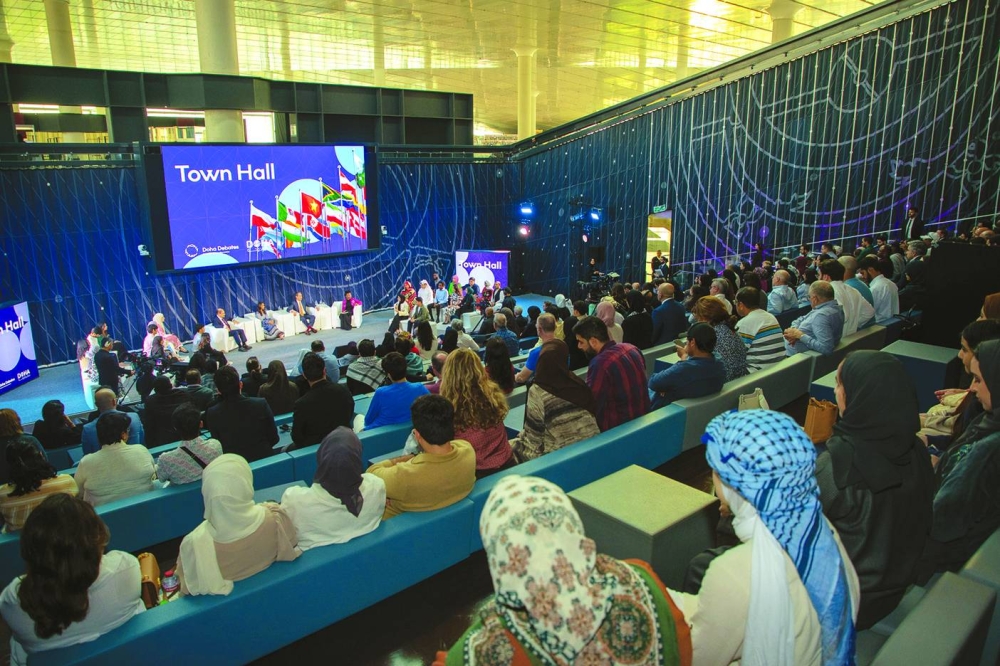Qatar Foundation’s (QF) Doha Debates, in partnership with Doha Forum, brought together foreign policy experts, university students and recent graduates for “Rise of the Rest: Who should lead in a multipolar world?” at Qatar National Library.
Attended by QF vice chairperson and CEO HE Sheikha Hind bint Hamad al-Thani, the town hall examined how shifting global powers might settle over the next decade as new forces and alliances such as BRICS (Brazil-Russia-India-China-South Africa) come to the forefront.
The Gaza genocide figured prominently in the conversation, with panellist Wadah Khanfar citing 'the controversial role' of the US in the wars in Gaza, Iraq, and Afghanistan as examples of why he believes the world should no longer accept one or two superpowers. Khanfar, president of Al Sharq Forum and former director-general of Al Jazeera, called for a realignment of global power centres.
“I do believe in the power of the people,” he said. “I do not trust centres of power to shape our future. I do believe people today are smarter, much more clever, much more strategic than generations before us. And, therefore, we would like to harness this energy in forging international alliances and movements not necessarily among state actors but also among those who are advocating values that everyone agrees upon.”
Jon B Alterman, senior vice president and Middle East programme director of the US-based Center for Strategic and International Studies, defended the US' superpower status. Alterman refuted suggestions the US tries to impose its will upon the world. “Leadership is not command. Leadership is an ability to coordinate and to inspire,” which he described as the US' intention globally.
The panellist said the US superpower status is an outgrowth of the aftermath of World Wars One and Two, which according to him, prompted the US to “create alliances with like-minded states to try to avoid the world getting into those kinds of problems again.” He argued the US remains uniquely positioned to play a global leadership role in dealing with the world’s most challenging issues, including climate change, infectious diseases, and human trafficking.
Sawsan Chebli, a foreign policy expert, columnist, and co-founder of the Arab-German Friendship Association, said the world would be better off if women were more empowered. “I think we have to rethink the way we think of global powers and leadership,” she said, calling for a more widely practiced “feminist foreign policy,” describing it as anti-colonial, anti-war, and anti-racist.
“We want women to be the next leaders. If we have half of the world’s population on stage, the result is going to be a better one because it’s more inclusive.” She said women playing a more prominent role is “the only way we can keep the world from falling apart more than it is already.”
The majority of the 20 students sharing the stage with the foreign policy experts contributed their views and suggestions to the conversation, with several saying the town hall broadened their perspective on how the world should evolve in a multipolar landscape.
Georgetown University graduate Hana Elshehaby expressed doubts about whether the US should be a global superpower. “We can all agree the world requires effective leadership. But the question here is, is that the US? How is the US, in this context of what is unfolding right now in Palestine, supposed to be considered and looked by the world as an effective leader?”
Palestinian student Yasmeen Abu Glazaleh expressed similar concerns. “I think the US playing as a unipolar power right now is very unfair to the rest of the world. Why is the US not stopping the killing of my people even though the world thinks it should stop?”
Pakistani-Pashtun Sara Akbar, a cyber security student at the University of Doha for Science and Technology, expressed alarm about the fast-growing global role of big tech companies. Suggesting tech companies are de facto superpowers, she said “The scary part is there is a lack of accountability, a lack of laws. How can we restrict them?” She called for tech companies to be better regulated to prevent them from gaining counter-productive power and influence.

